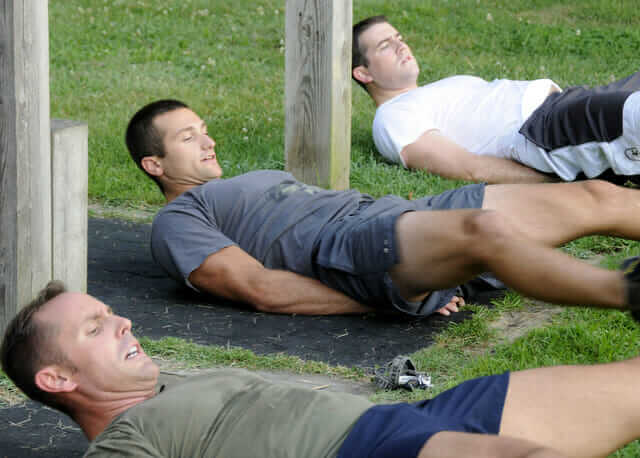Hazy, Hot, and Humid Summer Workouts/Practices: How to Recover Fast by Stew Smith
Any person or team who exercises in the heat needs to hydrate during workouts to stay cool and avoid over-heating and even potential death from heat stroke. Fatigue is part exertion and part body heat so your hydration plays a huge part in your athletic and tactical performance. Dehydration can occur during excessively sweaty workouts no matter how well you hydrate prior to your workout, but you also need to add electrolytes (sodium, potassium, magnesium, calcium as well.) Foods rich in many of these elements are essential to your recovery from significant water/electrolyte loss. If you are not sweating profusely during your workouts, the need for these salts are less and you will likely get the required salts from your regular diet. However, if you are in an arid environment like the desert, you will dehydrate without sweating and all you will see will be salt stains and chapped lips as the air is evaporating the moisture right off your skin.

If you are doing multiple hours in the heat with long races, long days working outside, two or three a day practices preparing for Fall sports, you need to think of the meal in between your working hours as not only a post workout meal but also a pre workout meal. Adding more water, salts, protein, carbohydrates, will help you feel better and have more energy for training or working. Once the day is done, it is even more essential to prepare for the following day in hot and humid environments.
(NOTE: The same applies to dry arid environments but you will not be able to wring the sweat out of your clothes – your sweat evaporates too quickly. You will see salt stains on your clothes and that means you need water and salts in your recovery meals.
If you can wring out your shirt after a workout, it will be beneficial to add more of these “salts” into your post exercise diet. Sure, you can add sports drinks but stay away from the extra sugar and electrolytes if you are not sweating. Sports drinks with sodium, potassium, carbohydrates (sugar) are a safe bet for hydration during hard sweaty exercise. If you are not sweating profusely, there is little need for these sports drinks during exercise unless you are in a desert environment where you do not sweat as it evaporates immediately. Bananas, kiwi, coconut juice and water are some of the best natural aids in re-hydrating and replacing electrolytes. Here are some more ideas for hydration:
Before Workouts– Do not drink too much 1 hour prior to hard workouts if you are doing significant running since the bouncing will potentially cause cramping. Although, most would rather deal with cramping than dehydration so think about your effort level when sweating profusely and what will work for your level of exertion in the heat.
During Workouts– Sip water or a carbohydrate/electrolyte mix every 10-15 minutes to maintain high intensity performance training.
A ballpark equation for daily consumption of liquids for highly active person is: 50-75% body weight in lbs = oz per day of H2O
Finding the right mix of carbohydrates, protein, fats, electrolytes and water all depends on your age, sex, weight, activity level, weather, and goals. Every day that you have a challenging workout with above average times and feel great afterward, make a note of everything you did that day. Often that is the formula that works best for you and your fitness performance goals.
After Workouts– If hot sweaty or covered in salt stains, you have a huge selection of post workout meals and drinks that will help you recover. Consider protein and carb replacement first, but if you are still feeling sluggish from the workout it is likely lack of fluids and salts in your post workout meal.
- One favorite post exercise quick snack is a can of chicken noodle soup (Campbells Noodle O’s) because it is loaded with potassium, sodium, carbs, and protein as well. In fact, it has about 3-4 times the potassium of a banana and about 5-6 times the potassium of Gatorade. If you are not sweating much and you’re not in arid environment, water will be enough to hydrate you.
STUART FISCHER, M.D., a graduate of Yale University, completed his residency at Maimonides Hospital in Brooklyn, and served as an Attending Physician at Cabrini Medical Center in New York City. He also worked with the late Dr. Robert Atkins as the Associate Medical Director of the Atkins Center. His expertise in alternative medicine, nutrition, and weight loss, is complemented by his strong traditional, hospital-based education. He is the author of The Little Book of Big Medical Emergencies and The Park Avenue Diet.





